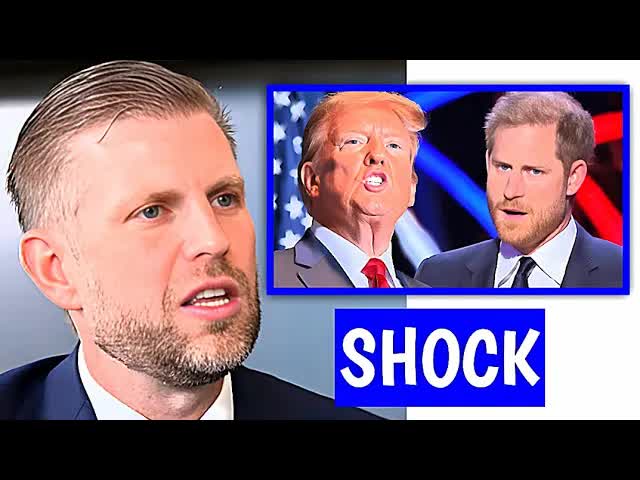Must Read
Eric Trump’s Bold Take on Harry and Meghan: A Clash of Royalty and American Values
In a recent interview, Eric Trump, the son of former President Donald Trump, stirred the pot with his candid remarks about Prince Harry and Meghan Markle.
His assertion that “no one cares” about the Duke and Duchess of Sussex has sparked a lively debate about their relevance in American society.
This unexpected commentary raises intriguing questions: Are Americans truly indifferent to the couple?
What does this mean for Harry's visa status in the U.S.?
And why is Eric Trump so invested in the royal narrative?
Eric Trump's comments reflect a stark dismissal of Harry and Meghan's popularity in the United States.
During his exchange with the Daily Mail, he expressed his lack of interest, stating, “Truthfully, I don't give a damn about Prince Harry, and I don't think this country does either.” He believes that the couple's decision to step back from royal duties has not resonated with the American public in the same way it has in the U.K. Eric contrasts their perceived unpopularity with his father's respect for the British monarchy, viewing Harry's exit as a personal failure that undermines the institution.
The question of whether royal popularity matters in the U.S. looms large.
Eric's comments hint at a broader detachment that some Americans feel towards the British crown.
Yet, despite his stance, the Trump family has maintained a long-standing connection with the monarchy.
Eric fondly recalls his father's warm relationship with the late Queen Elizabeth II, describing her as “amazing” and recalling how she welcomed Donald Trump with open arms.
This nostalgia underscores a respect for royal traditions that Eric feels Harry and Meghan have abandoned.
As discussions continue, the topic of Prince Harry's U.S. visa emerges as a significant point of contention.
Following revelations of past drug use in his memoir “Spare,” questions have arisen regarding the implications for his visa application.
Typically, applicants are required to disclose any history of drug use, and failure to do so could lead to deportation.
While organizations like the Heritage Foundation are advocating for transparency regarding Harry's visa, Eric Trump downplays the issue.
He suggests that the real concern lies not in legalities but in Harry's estrangement from royal life.
The dynamics between Prince Harry and his brother, Prince William, also came under scrutiny during Eric's interview.
He lauded William and Kate Middleton as exemplary representatives of the monarchy, stating that William has never faltered and calling Kate a stabilizing force for the royal family.
This admiration for tradition starkly contrasts with his view of Harry, whose choice to relocate to America is often seen as a departure from duty.
The comparison raises questions about the expectations placed on royals and whether breaking away should be met with criticism or celebrated as a courageous choice.
Despite Eric's claims of indifference, Harry and Meghan remain prominent figures in popular culture.
Since their move to California, they have consistently made headlines through lucrative deals with platforms like Netflix and Spotify, along with their charitable endeavors.
While Eric insists that Americans are uninterested, the couple's visibility suggests otherwise.
Are they simply a fixture of media fascination, or do they represent something deeper in the American psyche?
Eric's perspective on the monarchy reveals a traditionalist viewpoint that resonates with certain segments of American society.
He perceives the royal family as a symbol of stability, contrasting this with what he describes as Harry and Meghan's confusing narrative.
This dichotomy speaks to a generational divide, where older Americans may favor established traditions while younger generations lean towards modern interpretations of royalty.
The media's role in shaping public perception cannot be overlooked.
Eric's dismissal of Harry and Meghan's significance raises the question of whether the constant coverage is due to genuine interest or merely sensationalism.
Their story, full of drama and change, captivates audiences, yet it also prompts reflection on the nature of celebrity and public engagement.
Are we truly invested in their lives, or have we become desensitized to the ongoing spectacle?
Harry and Meghan's journey also highlights a cultural clash between British tradition and American individualism.
In the U.S., the concept of royalty holds less weight, allowing for a more casual fascination with figures like the Sussexes.
Eric's assertion that “no one cares” may reflect a broader sentiment that, while Americans may enjoy the drama, they do not feel a deep-seated obligation to the monarchy.
As the debate unfolds, the power of reinvention becomes a key theme.
Harry and Meghan's willingness to break away from royal expectations resonates with many who value authenticity and personal growth.
Their openness about mental health and the challenges of stepping into the public eye illustrates the complexities of leaving behind familiar comforts.
For some, Eric Trump's traditionalist views provide a sense of security; for others, the Sussexes' story serves as an inspiring narrative of courage and self-discovery.
Ultimately, Eric Trump's remarks about Harry and Meghan open up a rich dialogue about the intersection of tradition, modernity, and public perception.
While he posits that Americans may be indifferent to their plight, the reality is likely more nuanced.
Their experiences resonate with themes of independence and transformation, challenging age-old notions of royalty in a rapidly changing world.
As the conversation continues, one thing is clear: Harry and Meghan's journey is far from over, and it continues to spark debates that bridge the gap between two cultures.




















